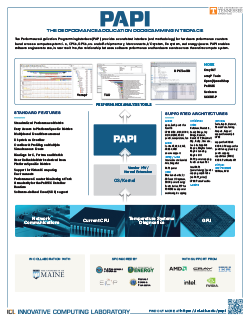ICL Research Profile
PAPI
Performance Application Programming Interface
Overview
The Performance Application Programming Interface (PAPI) offers a universal interface and methodology for gathering performance counter information from diverse hardware and software components. This includes major CPUs, GPUs, accelerators, interconnects, I/O systems, power interfaces, and even virtual cloud environments. Collaborations with industry leaders like AMD, Cray/HPE, IBM, Intel, NVIDIA, and others ensure seamless integration of PAPI with new architectures as they are introduced or come close to release. As the PAPI component architecture continues to expand, third-part performance tools interfacing with PAPI gain the automatic capability to measure data from these emerging architectures.
Two PAPI releases were shipped in 2023. PAPI 7.0.1 was officially announced on March 13th, 2023, and PAPI 7.1.0 on December 20th, 2023. These releases provide enhanced performance counter monitoring capabilities, extending support now to Intel Sapphire Rapids, AMD Zen4 CPUs, and ARM Neoverse V1 and V2 architectures. Notably, the ROCm component has been significantly refactored, enabling efficient monitoring of multiple GPUs in sampling mode and laying the foundation for future ROCm tools support. Additionally, the ROCm SMI component has been expanded to include GPU-to-GPU XGMI event support, offering a wider range of monitoring capabilities. Furthermore, the CUDA component has also undergone significant refactoring and now provides multi-thread and multi-GPU support.
In Collaboration With
- Texas A&M University
- University of Maine
- Virginia Tech
Sponsored by
- Exascale Computing Project
- National Science Foundation
- The United States Department of Energy
With Support From
- AMD
- Cray
- IBM
- Intel
- NVIDIA




